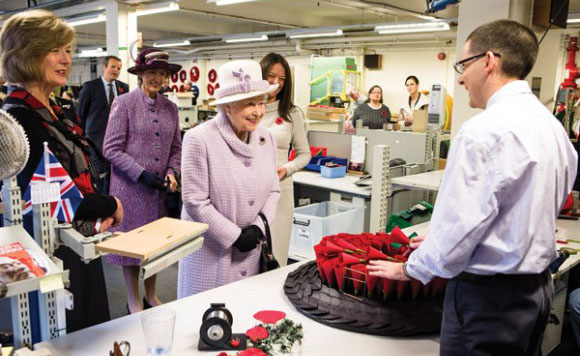By Trysh Ashby-Rolls
Among my earliest memories are bombs, rats in the air raid shelter, WWI servicemen, and the Poppy Factory. Until recently I thought the latter as much a myth as our family Homemade Cake Factory. Even though my mother pointed out a building not far from where we lived in Richmond, just outside London, as being “where the poppies are made.”For a week or two before Remembrance Day she would stand in the wind and rain selling those poppies to raise funds for veterans of both great wars.
Last November, HM Queen Elizabeth visited the Poppy Factory during her Diamond Jubilee Year and in celebration of the Poppy Factory’s 90th anniversary.
The first poppy appeal was in 1921 when Major George Howson, MC, and Major Jack Cohen imported red silk poppies from France. The two WWI veterans had started the Disabled Society in 1920. In 1922, the charity received a donation of £2,000 (about $3,300 Cdn) to make its own poppies for Remembrance Day. The original poppy factory opened its doors to 50 ex-servicemen who, within two months, made a million poppies. Outgrowing the factory, they moved to an old brewery building in Richmond and built housing for the workforce and their families next door. The present factory was built in 1932 where today 40 employees make both paper and synthetic “silk” poppies, sprays, wreaths and crosses.
The Poppy Factory is now a charity in its own right, helping wounded, injured and sick ex-Service men and women find meaningful and sustainable employment in the communities where they live around the U.K., with companies that fit their skills and wishes. To date, well over 300 men and women have been helped back to work, 74% of whom have sustained employment beyond 12 months. Many of these men and women have served in Iraq, Afghanistan, Northern Ireland, the Falklands and elsewhere.
The most recent recruit at the Poppy Factory is 59-year-old David Forbes. He played French horn and other brass instruments in the Royal Marines Band Service until he suffered a stroke that left him partially sighted. Seven years from retirement, and raised to believe the husband/father is the provider, it devastated Forbes to lose his job and not find another. Someone suggested he contact the Royal British Legion, and from there the Poppy Factory hired him to make poppies, crosses and wreaths for the Royal British Legion’s annual Poppy Appeal. He says: “It has been a lifesaver, given me something to live for. I feel like I am contributing and I am making a difference. My wife and I will never be able to thank the Poppy Factory and the Royal British Legion enough.”
The team at the factory are already working on merchandise for the 2014 Poppy Appeal. So far they’ve completed around 90,000 wreaths, and over 13.5 million of the 45.5 million poppies needed. This November 11th, buy a poppy. Lest we forget.




